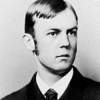Charles Horton Cooley

Charles Horton Cooley
Charles Horton Cooleywas an American sociologist and the son of Thomas M. Cooley. He studied and went on to teach economics and sociology at the University of Michigan, and he was a founding member and the eighth president of the American Sociological Association. He is perhaps best known for his concept of the looking glass self, which is the concept that a person's self grows out of society's interpersonal interactions and the perceptions of others...
NationalityAmerican
ProfessionSociologist
CountryUnited States of America
hero believe self
There is perhaps no sort of self more subject to dangerous egotism than that which deludes itself with the notion that it is not a self at all, but something else. It is well to beware of persons who believe that the cause, the mission, the philanthropy, the hero, or whatever it may be that they strive for, is outside of themselves, so that they feel a certain irresponsibility, and are likely to do things which they would recognize as wrong if done in behalf of an acknowledged self.
freedom children fall
Since freedom is not a fixed thing that can be grasped and held once for all, but a growth, any particular society, such as our own, always appears partly free and partly unfree. In so far as it favors, in every child, the development of his highest possibilities, it is free, but where it falls short of this it is not.
reflection self suffering
In the days of witchcraft it used to be believed that if one person secretly made a waxen image of another and stuck pins into the image, its counterpart would suffer tortures, and that if the image was melted the person would die. This superstition is almost realized in the relation between the private self and its social reflection. They seem to separate but are darkly united, and what is done to the one is done to the other.
life travel mean
The idea that seeing life means going from place to place and doing a great variety of obvious things is an illusion natural to dull minds.
life theatre alarms
Life is a theatre of alarms and contentions.
doubt selfishness purpose
Selfishness of the stable or rigid sort is as a rule more bitterly resented than the more fickle variety, chiefly, no doubt, because, having more continuity and purpose, it is more formidable.
running pride men
If the man succeeds in becoming indifferent to the opinions of his neighbors he runs into another danger, that of a distorted and extravagant self of the pride sort, since by the very process of gaining independence and immunity from the stings of depreciation and misunderstanding, he has perhaps lost that wholesome deference to some social tribunal that a man cannot dispense with and remain quite sane.
mean discipline use
So far as discipline is concerned, freedom means not its absence but the use of higher and more rational forms as contrasted with those that are lower or less rational.
character hypocrite men
If we divine a discrepancy between a man's words and his character, the whole impression of him becomes broken and painful; he revolts the imagination by his lack of unity, and even the good in him is hardly accepted.
eye leader mind
A strange and somewhat impassive physiognomy is often, perhaps, an advantage to an orator, or leader of any sort, because it helps to fix the eye and fascinate the mind.
lying communication ideas
We cannot feel strongly toward the totally unlike because it is unimaginable, unrealizable; nor yet toward the wholly like because it is stale - identity must always be dull company. The power of other natures over us lies in a stimulating difference which causes excitement and opens communication, in ideas similar to our own but not identical, in states of mind attainable but not actual.
character way looks
A person of definite character and purpose who comprehends our way of thought is sure to exert power over us. He cannot altogether be resisted; because, if he understands us, he can make us understand him, through the word, the look, or other symbol.
mean men should-have
Prudence and compromise are necessary means, but every man should have an impudent end which he will not compromise.
pain communication loss
One who shows signs of mental aberration is, inevitably, perhaps, but cruelly, shut off from familiar, thoughtless intercourse, partly excommunicated; his isolation is unwittingly proclaimed to him on every countenance by curiosity, indifference, aversion, or pity, and in so far as he is human enough to need free and equal communication and feel the lack of it, he suffers pain and loss of a kind and degree which others can only faintly imagine, and for the most part ignore.